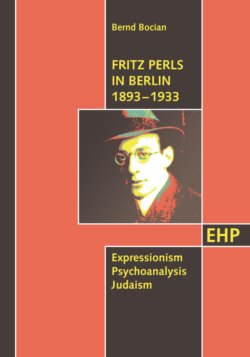Читать книгу Fritz Perls in Berlin 1893 - 1933 - Bernd Bocian - Страница 24
На сайте Литреса книга снята с продажи.
3.5 Perls’s Father. An Irregular Freemason
ОглавлениеThere were clear parallels between Fritz Perls and his father. »His father was eccentric, very much like Fritz, not a family man« (L. Perls 1997, 57). A well-ordered family life posed difficulties for the father and the son. For a large part of their lives both men were wandering nomads, had numerous extramarital affairs, and possessed a talent for winning people for themselves and their ideas and for creating a certain amount of enthusiasm. Conflict with the father was, as I have already mentioned, an experience that united a generation and can be seen as well in the personal lives of Kafka, Benjamin, Hesse, and Horkheimer. In all of the individuals named, including Perls, an orientation toward the mother is also to be found with respect to their mutual negative appraisal of their fathers. Erich Fromm, for example, whose father was also a wine merchant, likewise viewed himself as the defender of his often depressive mother against his father within the web of their mutual »unconscious hatred« (Funk 1990, 21). In the Perls household the hatred was not unconscious, nor was it apparently suffered in silence. Emotions would occasionally erupt and result in outright fighting, which was physical as well. In his old age, Perls was able to adopt a critical and differentiated perspective that also allowed for the likable, Dionysian side of his father’s character. This can probably be traced to Perls’s realization that he himself had failed as a husband and family man, and that blame for the failure was being placed exclusively on him. »At the parties, for instance Christmas, however, my father became his Rabelaisian self. He loved to dance the krapolka, to drink, to kiss. (…) Basically I hated him and his pompous righteousness, but he also could be loving and warm. How much my attitude was influenced by my mother’s hatred of him, how much she poisoned us children with it, I could not say. (Perls 1977, 250-251).
Freemason Nathan Perls was at first apparently a member of a so-called Odd Fellow Lodge. This »Independent Order of Odd Fellows« was founded in England around 1780, operated on a Christian basis, and viewed itself as a kind of confraternity in which the brothers supported each other socially and also engaged in charity work. Official Freemasonry in Germany did not accept this Lodge (and many others for that matter) as a Freemason Lodge and spoke of irregular foundings and Lodge-like organizations that had no connection with official Freemasonry (see Kischke 1999, 66). Peters calls them the »non-accepted brothers« (Peters n. d., 145) and thereby addresses a commonality shared by Nathan Perls and his son. Whereas for Nathan Perls it was official Prussian Freemasonry with its legally enshrined monopoly on founding lodges, for Fritz it was orthodox psychoanalysis and its bureaucratic apparatus that refused him a secure position. Father and son alike reacted by founding things of their own.
